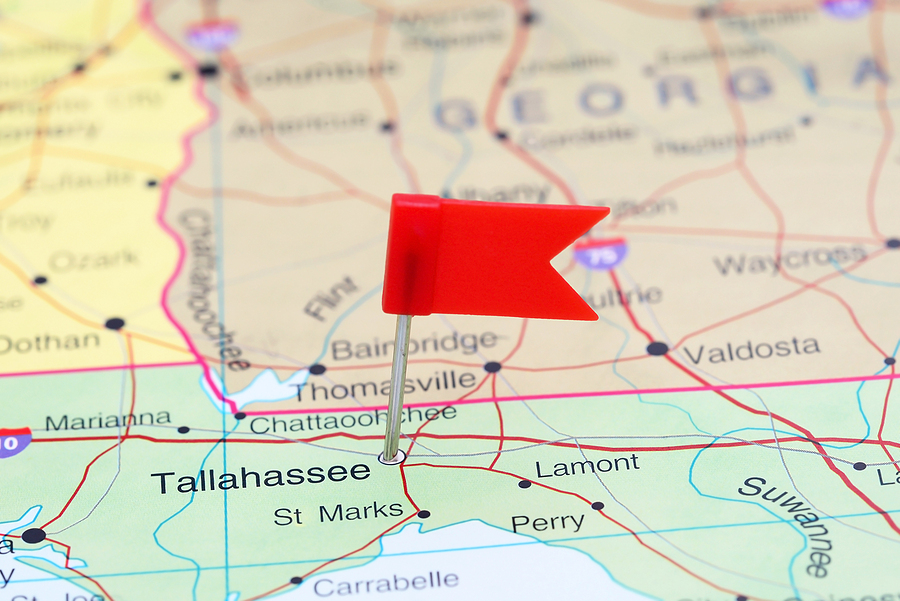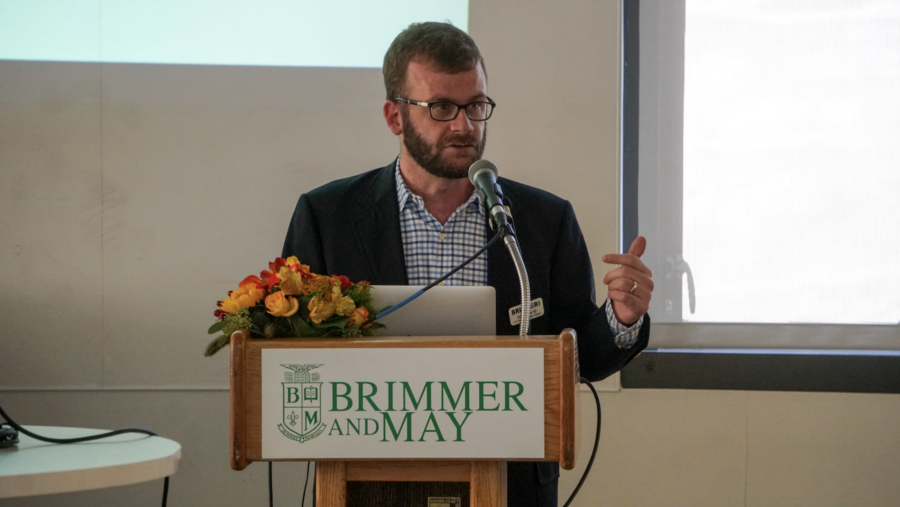However much I struggled, only when I found my passion for news reporting did my success in the humanities begin to soar — so much so, in fact, that I now teach journalism to my own history students, hopeful that they too will benefit from the combination.
I think it’s safe to say that this has resulted in a good degree of success.
Take it from Preston Michelson, who recently graduated from Northwestern University with degrees in journalism and political science. He served as founding editor of The Falconer, the student news site of Palmer Trinity School (Palmetto Bay, Florida), where I spent the first six years of my teaching career. I also taught him in yearbook, American History, and United States Government.
Michelson tells me that his experience as a high school journalist allowed him transfer two relatable tenets of continued success in the college classroom, “clarity and information gathering.” He says, “Clarity is relatively straightforward — writing is toothless without it. The nature of journalism as a sort of public service, writing on behalf of the reader, dictates that writing not be overcrowded or needlessly complicated. To me, this is a great tenet to follow in all kinds of writing, even in the academic realm. Not overcomplicating topics boils information down to its most vital elements.”
Michelson references the necessity of quality research in journalism and in academia. “When I started writing forThe Daily Northwesternin college, I was dispatched to cover topics new to me, everything from health care policy to Islamic theory. The role of a journalist is to act as a sort of expert no matter the newness and complexity of the topic, and that calls for doing your homework on every story. I conducted research for my history and political science research papers with much the same intensity.”
The Elephant in the Room
Of course, major differences exist between journalism and history. After all, journalism is the first, imperfect draft of history. Whereas reporters work under time constraints to produce the best obtainable version of the truth, historians hold themselves to a higher standard. They spend years conducting detailed research, carefully reconstructing cause and effect for a deeper, more complete rendering of past events.
For another take on the benefits of journalism for history students, I emailed Adam Hochschild, a revered journalist who teaches narrative writing at the University of California, Berkeley, co-founded Mother Jones, and has written eight nonfiction books, including one of my favorites, King Leopold’s Ghost: A Story of Greed, Terror, and Heroism in Colonial Africa.
A journalist writing for a deadline, he says, often focuses on attributing facts and quotations to a specific source. For example, a news article might read something like, “‘3.7% of the American population has schizophrenia,’ said Joe Doakes of the state Department of Health and Welfare.”
“That’s good enough for tomorrow’s newspaper, but it probably isn’t good enough for a history book,” Hochschild writes. “How were they measuring schizophrenia in the year from which your statistic comes? Did the official or scholar or agency you cite have motive for exaggerating or minimizing the figure? Those are some of the kinds of things a historian has to ask. Similar questions apply to all sorts of other assertions and statistics.”
Distinctions Aside
All distinctions aside, after ten years in the high school classroom, I’m here to report that history students benefit from also studying journalism, as did Nicole Font, who recently graduated with a teaching degree from High Point University. I also I taught her in various history and journalism courses at Palmer Trinity.
In high school, Font says, she found it difficult to write clearly and concisely. She would spend hours reworking long-winded prose. “A specific turning point for me as a writer was enrolling in your journalism classes,” she says. “I was immediately challenged to hone my writing and trim unnecessary words that I used to sound ‘interesting’ or ‘more intelligent.’ As a result, I found that my writing — in all subjects — developed so that I was writing for more than just my high school teachers. I could piece together paragraphs and join ideas in a more natural way, which contributed to my success as a writer in high school and college.”
Font’s comments remind me of another conversation I had with Sam Ravina ’17, the outgoing editor-in-chief of The Gator, an award-winning student site which I also advise, who told me that the newsroom helped him succeed at Brimmer and May (Chestnut Hill, MA), where I currently teach. When you learn to write about events with a “piercing objectivity,” Ravina tells me, you can transfer that skill to numerous forms of communications. He believes that journalism is no less fundamental than English or history, and he credits his time in the newsroom with his success in other academic classes.
“Journalism trained me to see the objective ‘point’ in all aspects of the humanities,” says Ravina, who plans to study philosophy at Davidson College (Davidson, North Carolina) in the fall. “In history, I can spot significant causes of events, and interpret a variety of sources to understand both sides of an argument. In English, my writing is astronomically more precise, and I developed a sharper eye for tone and complexity in literature. My leadership experience in the newsroom also transformed my ability to evaluate my own writing, and give and receive feedback to others. I cannot say enough about the extent to which journalism has helped me, and many others, develop the ability to think, reason, and write.”
To hear from someone in academia who straddles both worlds, I reconnected with Michael J. Socolow of the University of Maine, a media historian and one of my favorite journalism professors as an undergraduate at Brandeis University (Waltham, MA). “Journalism and history emphasize similar skills, such as learning how to build credibility by documenting sources and attributing information appropriately, and learning how to argue persuasively,” he wrote to me.
Reinforcing Writing and Thinking Skills
To reinforce those skills, my history students read newspaper and magazine articles — not just to keep them informed about today, which I care about, but also to foster discussion about sources and how journalists use evidence to craft a narrative. Whether analyzing works of history or conducting their own research, my students apply similar levels of scrutiny. Meanwhile, debate over what constitutes “fake news,” as well as how to spot it, encourages young minds to be vigilant about the types of sources they find and cite. As just one example, before they refer to a source, I ask if a New York Times reporter would trust that source. Whatever the response, before proceeding, students must defend their reasoning to me.
In this respect, Font intends to employ a similar strategy into her fifth-grade classroom next year, when she launches her own teaching career. “I recall how you constantly asked students to question where they got information, and how they planned to use it to express their learning,” she says. “You helped me think carefully about what sources should be trusted, especially if I wanted to be taken seriously by anyone who read my writing. I want to impart that crucial lesson to my own, much younger students, as well as introduce them to the news gathering, reporting, and writing process.”
With Font’s final point in mind, I have found that introducing students to journalistic writing also helps them find and engage an audience. Too often, high school teachers (including me) ask that students follow formal, academic structure — a worthwhile endeavor, but not if it precludes introducing history students to different forms of written expression. To address this deficiency, when teaching about Old Hickory, I read aloud several of my favorite passages from American Lion: Andrew Jackson in the White House, by Pulitzer Prize-winning author Jon Meacham. The first line of the opening chapter grabs their attention and leaves them wanting me to continue: “Christmas in 1828 should have been the happiest of seasons at the Hermitage, Jackson’s Plantation twelve miles outside Nashville.”
I tell students how much I admire Meacham, a former editor-in-chief of Newsweek, whose work has appeared in the nation’s most respected publications. I recently contacted him, curious whether he thinks academic historians, in the trenches of archival research, could or should learn from how he crafts engaging narratives, which appeal to a wider readership than historical monographs might. “It’s not my place to lecture or speculate on other people’s literary styles,” he says. “If we are writers, we all have different seasons, if you will . . . There’s room for everything.”
Meacham nails what I hope to convey to my students — that even as teachers defend the virtues of the five-paragraph essay, they should also make room in the curriculum for not just narrative writing, but journalistic writing as well. I also want my history students to want to share their work with others, and the idea of sharing academic writing seldom excites them. With that in mind, last fall, capitalizing on their heightened interest in Jackson, I assigned my students a more creative task:
“This is like Andrew Jackson’s victory. This is the people beating the establishment,” Rudy Giuliani, former mayor of New York City, told MSBNC’s Chris Matthews. “And that’s how he [Donald Trump] posited right from the beginning: the people are rising up against a government they find to be dysfunctional. And yes, it’s a defeat for the Democrats, but this is a defeat for some Republicans too.”
In what respects, if any, do similarities exist between President Andrew Jackson and President-elect Donald Trump? What might these parallels reveal about our nation’s future? Or is Giuliani off base here? Either way, please compose a well-written, convincing piece that supports your stance.
Several students asked to post their work to The Gator. “Apart from their flamboyant hairstyles, Donald Trump and Andrew Jackson share a variety of frightening similarities — and this could spell more than just a fashion disaster for America’s future,” writes Sophie Lapat ’18 for the lede of her story, “Trump: The New Jackson?”
Her article doesn’t qualify as history writing, but in this case, that doesn’t bother me. Rather, I care that Lapat expresses herself clearly, in a way that grabs my interest.
After completing this assignment, Lapat may have a better idea of how to employ similar tactics of clarity and engagement to succeed on a more traditional essay assignment, such as assessing whether Truman acted wisely by using atomic warfare to end World War II. “As someone who enjoys writing, I’ve often felt there is a prescribed way to do research and shape my voice,” Lapat told me. “This assignment gave me a new sense of confidence and provided me with a creative avenue to enjoy History.”
Coming Back Around
All of this leads us back to something else Hochschild told me:
Spending ten years as a magazine editor was hugely useful to me. All the time you are making judgments: Are people going to want to read this article? Why? Why not? How can we make it better? Does it need more scenes, characters, suspense? How can we draw in readers who don’t have a pre-existing interest in the subject? Those are things that a historian always has to think about if you want people to read what you write.
I want people to read what high school students write — and teaching journalism along with history is helping make that a reality.
If you’re still not sold on the potential value of teaching journalism to history students, Meacham says, “I see a direct connection between what I learned in journalism and what I’m doing now,” explaining that insofar as he has anything to say in his books, it’s because journalism exposed him to politics and public life at an early age.”
For his part, Michelson credits much of his success at Northwestern with his experience in the high school student newsroom. “That’s when I really started to understand the importance of journalism and the universality of it. I felt that in many of my other high school classes, I was taught different ways of approaching research, whereas in journalism, simplicity was key. It was about understanding the story and telling the story, while adding expert analysis where applicable. That’s a blueprint to succeed across the board.”
I couldn’t put it better myself.







